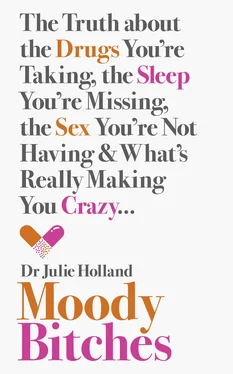Obviously, we must be cautious in discussing differences between the sexes because there is a large variation within each gender, and nurture and culture factor in nearly as much as nature does. There is interplay between our natural abilities and how we are molded to behave that is impossible to fully tease apart. Case studies of children with ambiguous genitalia who are raised to be male or female even though they possess the opposite genetic material are rare, but they do help to teach us one thing: the influence of biology cannot be underestimated. Often, our own balance of testosterone and estrogen levels dictates how aggressive we’ll be in a pickup game of basketball (or if we’d ever be caught dead in a pickup game of basketball) more than anything our parents ever taught us.
The Downside to Feeling Deeply
While biology may provide women with a set of attributes, from brain structures to hormones, that are advantageous in our traditional roles of nurturing and caregiving, there is a downside. These same attributes may also make us more inclined to suffer from depression and anxiety. In childhood, no difference exists in the prevalence of depressive disorders between girls and boys. In adulthood, women are twice as likely as men to experience depression and two to four times more likely to be diagnosed with an anxiety disorder like panic attacks or generalized anxiety.
The increased risk begins early in adolescence as puberty strikes. It ends by age sixty, when hormonal cycling ceases. Although some of the increased incidence of depression in women may result from societal factors like body image pressures, or their greater tendency to seek help for mental health issues, or diagnostic bias among doctors, there is strong evidence that much of the gender difference in mood disorders is linked to hormones.
Some women are more susceptible to hormonal fluctuations than others. There is a subgroup of women who seem to be at risk for what’s called reproductive depression, that is, mood changes caused by variations in hormone levels, like those seen prior to menstruation or after delivery. If you’re the PMS type, you’re also more likely to have postpartum depression or perimenopausal mood instability. Certain women have a specific sensitivity to these hormonal changes while some lucky ones don’t, possibly dictated by genes governed by changing estrogen levels. The good news is, when your hormones aren’t fluctuating, like when you’re postmenopausal, the risk for depression isn’t elevated. After menopause, the risks even out, especially two years after the final menstrual period, when the dust has settled. There is truth to the idea that the years after menopause are a real prime time of life for many women, both professionally and personally.
Again, there are likely evolutionary reasons for mood variability being tied to hormonal fluctuations. There is a positive mood state (called euthymia) in the first half of the menstrual cycle, leading up to ovulation, that encourages a woman to connect with mates and conceive. The more depressed, progesterone-heavy state in the second half of the cycle helps to ensure the safety of the product of conception by keeping the woman passive, cautious, and out of danger. Progesterone rises during the second half of the menstrual cycle and surges even higher if an egg is fertilized. It is the main hormone that maintains pregnancy. Progesterone is implicated in premenstrual syndrome, postpartum depression, and dysthymia, a chronic low-grade depression. The increased incidences of depression and anxiety during pregnancy (particularly in the first trimester) and the immediate postpartum period come during crucial periods for the baby, when more cautious and isolative maternal behavior can help ensure the baby’s survival. If women develop these behaviors, whether conserving precious energy or avoiding dangerous situations, then these traits will be passed on. Viva Darwin.
Anxious and depressed behaviors have survived in our gene pool for millennia because they are adaptive. They confer an advantage to our survival and that of our offspring. An anxious, obsessive forager will not only find more food, but will also return home safely. She is also more likely to keep her children out of harm’s way. Likewise, a depressed woman will more quickly withdraw from wasted enterprises, whether pursuing food or a mate, and conserve her energy. This may be the basis for seasonal affective disorder, which causes lower energy and motivation when food supplies are most scarce.
When women feel under threat, estrogen helps us to “maintain,” to be resilient and bounce back. In this way, estrogen is really acting as a stress hormone. One of the ways estrogen builds resilience is by enhancing serotonin levels, which help to keep us fortified, calmer, more rational, and less emotional. Serotonin activity is greater during higher estrogen levels. When estrogen surges, it causes more serotonin to be made, and it also causes serotonin receptors to be made. But, as with most things in the body, what goes up must come down. The natural process of stress triggering surging estrogen levels has a built-in stop mechanism, which then normalizes our serotonin levels.
SSRIs are the most common treatment for depression and anxiety, but if you’re on SSRIs, with steady serotonin levels, you miss out on this natural ebb and flow of serotonin in response to estrogen. You stay more rational and less emotional. Estrogen fluctuations help to keep us sensitive. SSRIs deaden our sensitivities.
More women than men get depressed, and estrogen may have a lot to do with this. Estrogen affects how serotonin functions in the brain. Women are more vulnerable to changes in serotonin levels and more responsive to drugs and medicines that affect serotonin. This is one reason that women may be more affected by sexual side effects of SSRIs than men. So where you are in your menstrual cycle or your perimenopausal staging will have effects on your mood, like how irritable, sensitive, or impulsive you are, as these behaviors are affected by serotonin. As you’ll see in the next chapter, it’s normal to have times in your cycle when your estrogen is lower, which means your serotonin will follow suit and you’ll feel lousy. It’s temporary and it’s natural. You don’t necessarily need daily antidepressants to mask these moods.
SSRIs can do many wonderful things for people with serious depression, and I have to admit that my patients love the way they make them feel, at least at first, but they can also take many sensations away. SSRIs tend to blunt negative feelings more than they boost the positive ones. On SSRIs, you probably won’t be skipping around gaily with a grin plastered on your face; it’s just that you’re less likely to feel tearful, irritable, and hopeless. People on SSRIs report less of many other human traits: an ability to cry, irritation, care about others’ feelings, sadness, erotic dreaming, creativity, surprise, anger, expression of their feelings, and worry.
One of my best friends from college told me a story of when she was first prescribed fluoxetine. “It really scaled back my empathy. Since I was a young girl, I’ve always felt bad if someone else felt bad. It’s a big part of who I am. I would let the other kids find the Easter eggs during the hunt, because they seemed to want them more than I did. When I first went on fluoxetine, I remember seeing another woman crying and thinking, Looks like you have a personal problem. Sucks to be you. This is what it must feel like to be a dude.” SSRIs affect emotional processing and turn down the empathy response. This can have devastating effects on the ability to parent or to maintain relationships.
It’s All Right to Cry and Get Angry
Antidepressants can be utilized as a starting point for benefiting from psychotherapy or creating lifestyle changes, but once those behaviors are firmly in place, the medications often can and should be tapered off. If you break your leg, you don’t keep the cast and crutches forever. Before you commit to a lifelong SSRI prescription, consider the dynamic emotional range you might be giving up.
Читать дальше












